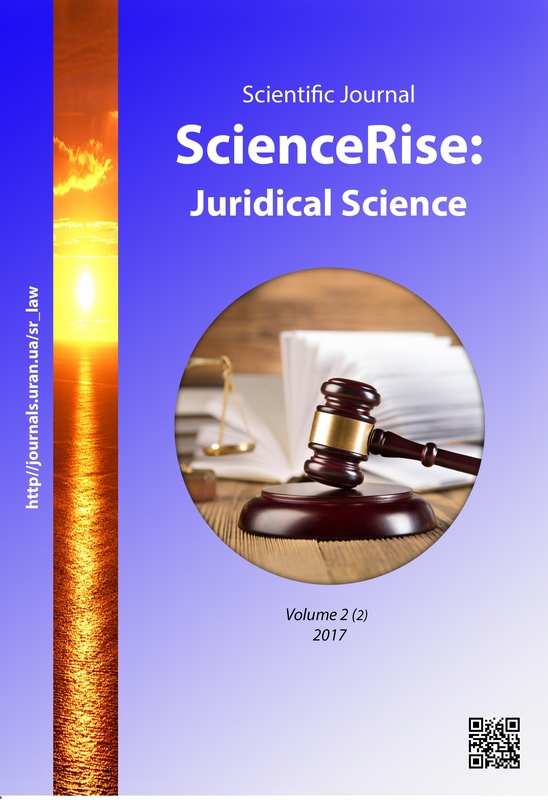Political and legal characteristics of extremism
DOI:
https://doi.org/10.15587/2523-4153.2017.116078Keywords:
extremism, ideology, extreme, crisis, violence, hatred, contradictions, radicalism, terrorism, fanaticismAbstract
The concept, essence, social conditionality, types and consequences of extremism is considered in the article. The opinion that extremism is not only aggressive actions, violence, but also negative attitudes, beliefs, moods, hatred, cruelty, approval of radical actions and statements is proved. Extremism is considered as one of the forms of manifestation of legal nihilism.
There are such features of extremism as extreme, categoriality, peremptoriness in theory and practice, the representation of own position as the only correct, the striving to achieve desired in any way, including by violence, which is justified at the ideological level. The extremist ideology is formed on the basis of traditional ideologies by their radicalization. The above-mentioned features characterize the essence of extremism.
Extremism is a consequence of social and cultural contradictions in modern society. Strengthening of extremist attitudes is observed where there is inequality and opposition of the interests of social groups in political, economic, social, spiritual, interracial, interreligious, geopolitical and other relations. The main source of extremism is the crisis state of society, which generates its anomie.
There are such types of extremism as political, religious, nationalistic and ecological extremism. Each of them reproduces the main features of extremism and has its own specifics. In particular, political extremism is an ideologized, organized, destructive and systematic political activity of both individuals and organizations, states, international organizations, which contradicts the officially proclaimed policy of the country and the current legislation, or even threatens the survival of entire communities or all human civilization. The intolerance to representatives of other faiths or rigid confrontation within one faith is characteristic of religious extremism. This is a kind of extremism, based on religious ideology. Nationalistic extremism manifests itself in the extreme forms of nationalism, racism, fascism (its present form of neo-Nazism), xenophobia, chauvinism, anti-Semitism. Ecological extremism is caused by aggravation of environmental problems, deterioration of the environment. Environmental terrorism, which is defined as deliberate pollution of the environment for the sake of blackmail in order to achieve certain political, economic or ideological goals, is the dangerous manifestation of ecological extremism.
It is proved that extremism is an anti-legal ideology. It leads to violation of rights, freedoms and legitimate interests of legal entities.
It is impossible to overcome extremism completely, because there will always be contradictions that cause it in society. However, it is necessary to counteract extremism, thereby reducing its manifestations and minimizing the consequences. It requires coordinated measures of socio-economic, political, legal and ideological measures aimed at overcoming the contradictions in society
References
- Berdyaev, N. A. (1990). Filosofiya neravenstva. Moscow: IMA-Press, 286.
- Beron, R., Richardson, D. (1997). Agressiya. Saint Petersburg: Piter, 336.
- Fromm, E. (1994). Anatomiya chelovecheskoy destruktivnosti. Moscow: Respublika, 447.
- Senin, I. N. (2011). Ekstremizm kak forma pravovogo nigilizma v sovremennoy Rossii. Avtonomnaya nekommercheskaya organizatsiya vysshego professional'nogo obrazovaniya «Omskiy ekonomicheskiy institut». Omsk, 218. Available at: http://www.dissercat.com/content/ekstremizm-kak-forma-pravovogo-nigilizma-v-sovremennoi-rossii
- Kremenovska, I. (2017). Ekstremizm i radykalizm i Ukraini. Vilne slovo. Available at: http://vilneslovo.com/екстремізм-і-радикалізм-в-україні/
- Shakhov, V. A.; Shemshuchenko, Yu. S., Babkin, V. D., Horbatenko, V. P. (Eds.) (2004). Ekstremizm. Politolohichnyi entsyklopedychnyi slovnyk. Kyiv: Heneza, 181.
- Yak Ukraina pidhotuvalasia do yadernoi viiny KNDR i SShA. Available at: http://fakty.ictv.ua/ua/svit/20171023-yak-ukrayina-pidgotuvalasya-do-yadernoyi-vijny-kndr-i-ssha/
- Hariacha dvadtsiatka: dynamika protestiv antyhlobalistiv na samitakh G20 z 2008 roku i do sohodni (infohrafika). Available at: https://www.unian.ua/politics/2016789-garyacha-dvadtsyatka-dinamika-protestiv-antiglobalistiv-na-samitah-g20-z-2008-roku-i-do-sogodni-infografika.html
- Nikitin, A. G. (2010). Ekstremizm kak ob"ekt obshheteoreticheskogo i obshhepravovogo analiza. Chastnoe obrazovatel'noe uchrezhdenie vysshego professional'nogo obrazovaniya «Institut ekonomiki, upravleniya i prava g. Kazan». Kazan, 257. Available at: http://www.dissercat.com/content/ekstremizm-kak-obekt-obshcheteoreticheskogo-i-obshchepravovogo-analiza
- Pro osnovy natsionalnoi bezpeky Ukrainy (2003). Verkhovna Rada Ukrainy, No. 964-IV. Available at: http://zakon3.rada.gov.ua/laws/show/964-15
Downloads
Published
How to Cite
Issue
Section
License
Copyright (c) 2018 Vira Tymoshenko

This work is licensed under a Creative Commons Attribution 4.0 International License.
Our journal abides by the Creative Commons CC BY copyright rights and permissions for open access journals.
Authors, who are published in this journal, agree to the following conditions:
1. The authors reserve the right to authorship of the work and pass the first publication right of this work to the journal under the terms of a Creative Commons CC BY, which allows others to freely distribute the published research with the obligatory reference to the authors of the original work and the first publication of the work in this journal.
2. The authors have the right to conclude separate supplement agreements that relate to non-exclusive work distribution in the form in which it has been published by the journal (for example, to upload the work to the online storage of the journal or publish it as part of a monograph), provided that the reference to the first publication of the work in this journal is included.








